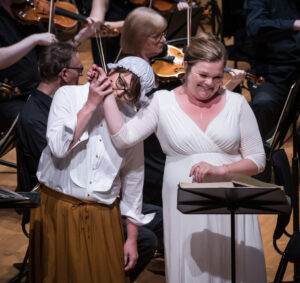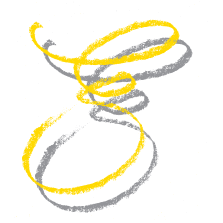Remarkable singing actors makes Saffron Opera Group’s Rosenkavalier a significant achievement.

Catherine Carby (Octavian as ‘Mariandel’) and Ella de Jongh (The Marschallin) © Roger King
In composing Der Rosenkavalier Richard Strauss and Hugo von Hofmannsthal, respectively the greatest German composer and librettist of the early twentieth century, were collaborating together for the second time. Rosenkavalier has become one of Strauss’s most popular operas despite critical opinion turning against it in its early years and the fact that composer and librettist both became somewhat dissatisfied with elements of their creation. It is clear that we are being given not only a poignant portrait of human relationships and class envy, but also something of a neo-Baroque comedy of manners and a successor to Mozart’s Le nozze di Figaro. In the first scene, having the ‘trouser role’ Octavian dressed up as a maid – here wonderful portrayed by Catherine Carby despite this being a ‘concert performance’ – clearly is a homage to Cherubino. But the liberalism of the early twentieth century is also reflected by having Octavian and Sophie unite to drive out the old aristocracy and its decadence as typified by Baron Ochs.
A number of other things in Der Rosenkavalier do indeed seem remarkably modern: the Marschallin’s self-consciousness, the very open and frank sensuality in the opera, as well as its scathing critique of blundering masculinity. The Marschallin’s arrival in the final act supplies one final twist too. She calls the whole plot simply ‘a farce’ and by displaying her moral authority and dispensing the noble and traditional values of discretion, benevolence, and personal self-sacrifice in magnanimously pardoning the young lovers who have conspired against her, she orchestrates the expected happy ending. In the last act, as the various social strata coalesce with the juxtaposition of a princess (the Marschallin), a count (Octavian), a baron (the newly-ennobled Faninal, Sophie’s father), with the various servants of different rank, the librettist and composer’s choice of a period setting makes real sense; we are clearly in the mid-eighteenth century and the contemporary setting for this Mozart-inspired opera.
Unfortunately despite (I believe) some traditional cuts a very thin plot with only four significant characters unfolds leisurely during 3½ hours of music which with two intervals made for a very long matinee performance but at least those enjoying Saffron Hall’s air-conditioning were sheltering from this year’s September heatwave. Der Rosenkavalier is far from my favourite opera, yet more often than not the waltzes weave their magic and make it an enjoyable experience. Overall, that certainly was the case here with this first foray into the music of Richard Strauss by the enterprising Saffron Opera Group who will celebrate their tenth anniversary in September 2024 by reprising their very first performance (which I saw and heard), Die Meistersinger von Nürnberg.

Michael Thorne conducts Saffron Opera Group’s Der Rosenkavalier © Roger King
As a concert version the first two acts worked best because of their greater intimacy (in more ways than one!). However, there is lots of to-ing and fro-ing in Act III especially when – as the synopsis has it – ‘grotesque apparitions pop out of windows and secret panels’ and what we saw, or rather did not see on this occasion, meant despite the best efforts of a remarkable ensemble of singing actors I even began to lose the plot even though I have seen Rosenkavalier a few times. Compounding this was Strauss’s inability to understand when enough was enough as the opera meanders to its end, regardless how sublime that end is when we get there with the Marschallin-Octavian-Sophie trio and concluding love duet.
It is difficult to fault the singers and though scores were mostly used some knew their roles better than others. Ella de Jongh deserves a very special mention because she sang the Marschallin after stepping-in for a previously announced singer with only a few weeks’ notice. Despite her relative youth de Jongh made her monologue in Act I – when the Marschallin convinces herself to send her young lover away and come to terms with a new role as a matron – an emotional and psychological highlight of this Rosenkavalier (as it must be). In the third act she sang and acted well with considerable poise, understated resignation and much sadness, and was vocally radiant in that trio near the end when she created some eloquent lines with much subtle expressive shading. (I see de Jongh is only ‘reserve candidate’ for the final of The Mastersingers Wagner Vocal Competition; those supposedly better than her must be something really special!)
Catherine Carby was an excellent Octavian and brought to her character a certain maturity which together with an understated masculinity made all the comic business in Acts I and III – when disguised as her female alter ego ‘Mariandel’ – really very funny. Carby’s voice was rich, full and better able than some to rise above a sometimes too loud orchestra and Strauss’s hectic scoring. The ultimate object of Octavian’s affection, Sophie, who Baron Ochs intends to marry to secure his financial security was sung by Lucy Hall. She veered appealingly between girlish exhilaration and twenty-first century spoilt-brat laddishness. Hall had a pure, sweet-toned voice and sang well with the presentation of the silver rose and the duet with Carby’s Octavian in Act II being particularly beautifully achieved between them both.
Singers of Baron Ochs seem to be getting younger lately (for one, Günther Groissböck) but Andrew Greenan was the epitome of an older, arrogant, self-deluded boor with a disrespect to women boarding on that of the currently infamous Luis Rubiales, such that his coarseness and lechery was quite repulsive at times. This is a very challenging and long role for any bass and Greenan should be commended for what he did with it.

Georgia Mae Bishop (Annina), Andrew Greenan (Baron Ochs) and Peter Van Hulle (Valzacchi) © Roger King
Saffron Opera Group fielded a remarkable cast of young and less-young talent all abetted by a small valiant chorus. The veteran tenor Bonaventura Bottone was in amazing voice as a vainglorious Italian tenor and Elaine McKrill sang well as Sophie’s devoted duenna and when she described Octavian’s splendid arrival I almost believed I saw it too! The Italian intriguers, Annina and Valzacchi, who are so disgruntled by failing to get any payment from Ochs that they assist Octavian in bringing about his downfall, were astonishingly well played by Georgia Mae Bishop and Peter Van Hulle whose very presence on the floor of the stage caused one’s eyes to be drawn to him in his paisley shirt even when he was not singing a note. In making so much of so very little he reminded me very much of that great character tenor we have recently lost, the much-missed Graham Clark. Solid performances all round from the rest of the cast in a variety of roles with William Dazeley and Gerrit Paul Groen notably catching the ear, respectively. as Faninal and the Police Commissioner.
The Saffron Opera Group’s orchestra (83 listed in the programme) under their regular conductor Michael Thorne seemed on top-form and together they all gave a brilliant account of this swooniest of scores, swirling confidently through what is so often little more than a concoction of waltzes. Perhaps there have been many more potent and erotically charged preludes and after what was more interruptus than coitus Thorne’s account had a consistently mellow inner glow and musicality and he never over-egged the sentiment. Despite the music occasionally seeming to become suspended in time, it never really lost momentum or flow, even though because of its colours and sensuous gestures it sometimes overwhelmed the action, or lack of it, in the opera.
Despite my reservations about Der Rosenkavalier as an opera, there is no doubting the significance of the achievement of Saffron Opera Group in being able to put it on.
Jim Pritchard
